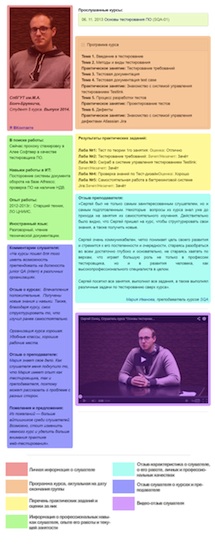What is better for the student of the training center: online profile or certificate?
 What does the listener dream of coming to Java, testing, or IT marketing courses? Of course, to gain knowledge and skills, apply them at the current place of work or successfully get a new place. Will the certificate obtained at the output become reliable evidence of the full development of the material? Is the name of the course, training center and date of training sufficient for the future employer?
What does the listener dream of coming to Java, testing, or IT marketing courses? Of course, to gain knowledge and skills, apply them at the current place of work or successfully get a new place. Will the certificate obtained at the output become reliable evidence of the full development of the material? Is the name of the course, training center and date of training sufficient for the future employer? Our answer: “NO! Sax paper! We need to break stereotypes. ”
For a year now, we have been setting up online profiles for students in place of traditional certificates and certificates of attendance at the Uransoft training center . How we came to this and what results we got - read under the cut.
The last straw that prompted us to write this article was the resume that the applicant sent us. It consisted of scans of various diplomas (about 20) collected in a ppt presentation.
Having appreciated the “beauty and informativeness” of the solution, we realized: with the idea of online profiles, we are on the right track.
“Ideal” profile and requirements
From the name it’s clear that this is some information about the student. Let's imagine the perfect online profile. To do this, take into account the points of view of three parties: the training center, the student and the future employer.
Training Center Requirements
The listener profile is a great opportunity to show your product face. In this case, by product we can mean both the training course and the student, who, at the end of the course, acquired certain skills and knowledge. What does the training center want to talk about? Of course, first of all, about my educational content:
- Details of the course: program, lecture topics and their abstracts, videos with a teacher and a course;
- The most interesting: information about practical exercises - what task was set for the listener and how he completed it, grades, attendance;
And also about the listener:
- Brief information - who he is, what he specializes in, why he went to courses and what plans he has for the future (for example, wants to get an internship at an IT company);
- The general feedback of the teacher about the student is an assessment of interest in the topic / subject, work in a group and at seminars, homework and final work, communication skills, personal qualities and so on;
- Links to the resume of the listener and his contacts in social networks;
- A video of the listener himself, where he talks about why he came to the course, whether his expectations were met, what was good, and what needs to be worked on.
HR / employer requirements
The profile will solve the main problem here - without inviting the applicant for an interview, it will help to form an idea of the future employee. Therefore:
- The profile must be accessible, open and searchable through search engines;
- Information must be authentic (authentic and reliable);
- There must be an identification of the applicant (unambiguously identify - name, photo, age, education);
- Correct information should be given on the course that the applicant listened to (since the courses are constantly being updated and changed, the information is relevant at the time of listening to the course);
- The ability to verify the information provided by the listener (for this there are publicly available contacts of the teacher);
- “Video business card” - the employer will immediately be able to evaluate how a potential job seeker expresses his thoughts.
Requirements of the listener as a potential applicant:
In addition to all of the above, the course participant needs the opportunity to:
- to provide informative and objective evidence of the fact of training (not only in its presentation, but in the opinion of an independent competent party);
- demonstrate the desire for professional development, loyalty to the profession (spent money and time).
- self-PR and additional information about yourself.
What we designed
Having analyzed all the requirements, we formulated the main idea.
So, the online profile of the student should be a page on the website of our Uransoft training center. It should have:
- personal information about the listener: his photo, name, work experience, IT skills and knowledge, links to personal profiles in social networks, links to resume websites)
- information about the course / courses attended with the teacher’s review (detailed program and content, theory and practical tasks of the course, teacher’s review both about the listener himself, and about his work and tasks performed during the course)
- student feedback on the organization of the courses as a whole, separately on the course taken and feedback on the teacher.
Also, the online profile should carry, in addition to confirming the knowledge of the student, also the function of direct contact of the employer with the teacher or the founders of the courses. Naturally, the listener can place a link to his profile in his resume on any headhunting site.
What and how was implemented
1) We highlighted the section “Profiles of listeners” on the site. While the volume is small (we also did not immediately come to the idea of making profiles), they are displayed on one page. Soon there will be a division by direction / course / year. 2) The structure of the profile itself - see clickable illustration. You can also watch "live" on the site . 4) Integration with online resume. You can publish links to an online profile in a resume, regardless of the resource of placement. 5) Social networks. You can post links to courses on your profiles in any business and not very social network.

6) On the day of the end of each group, we will necessarily shoot video reviews of students, photos of the entire group and each listener separately. The video is placed not only on the listener's page, but also serves as an illustration to the description of the course (for example, a course in IT marketing, the tab “Video reviews” ). That video is well indexed in search engines and appears in the issuance of thematic and personalized queries.
Of course, there were some difficulties.
- Laziness of listeners and unwillingness to provide information about themselves (not for reasons of confidentiality), some have
tobeforced \ forced \ beaten up with a pointer on the head topersuade - The audience’s misunderstanding of why this is necessary: “A profile is good, but we still want a piece of paper. What for? - To be! It’s more familiar and general. ”
- To solve the previous paragraph, a conversation was made with a certain functionary of the native institute (SPbGETU - co-founder of Uransoft, we wrote about it on Habré ). We now have the opportunity to issue state-issued certificates, but this is an extra added cost, relevant only for students from the public sector and large corporations.
results
The first employer who used the information on the online profile was ourselves, taking several testers for an internship in our IT company .
At first, only a part of the listeners actively used the provided tool (we evaluated using the site’s logs). One listener even asked to delete the profile, because got a job not according to her profile and didn’t want to have “extra” information about herself on the Internet. Now almost all students in each group are asked to create a profile on them - even those who are not actively looking for work.
Finally
From the requirements that listeners, employers and training centers have, it is clear: in order to confirm the skills and qualifications, the names of the course, the date of passage and the name of the teacher - NOT enough . A traditional paper certificate will not cover even a hundredth of these requirements.
Time will tell how correct our idea was. Will other training centers copy it? Will such information be in demand among hunters and end employers?
In the future, we plan to supplement the profiles with stories of how the professional fate of our students has developed.
By the way, if this article is read by employees of IT companies from St. Petersburg and you are constantly looking for interns / beginners in our main areas - hello, we want to work with you,write to us .
Thanks to the co-author of the article - staskin1 , and for the illustrations - thanks to Comandante_WilD .
